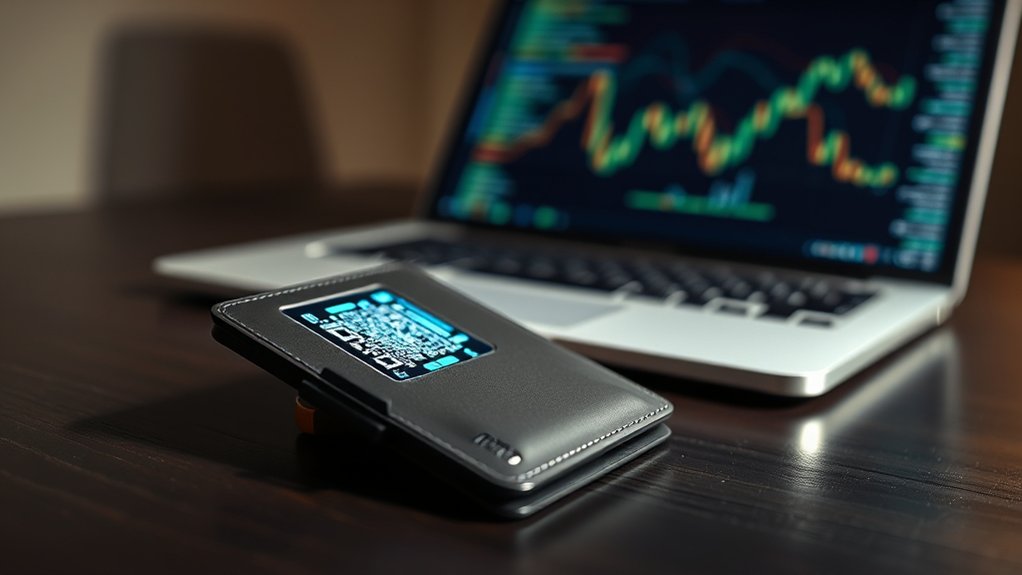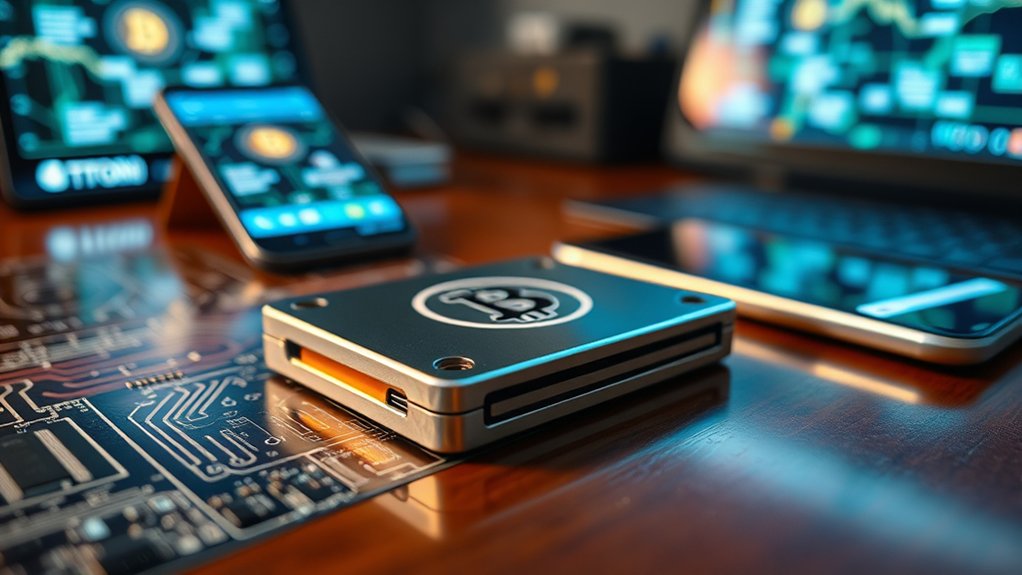A Bitcoin wallet? It’s basically your digital vault for holding cryptographic keys. You can’t see your Bitcoin; it lives on the blockchain—like a ghost. Wallets let you send, receive, and track your transactions easily. Think of it as a bank, but with fewer fees and less trust. There are different types, from mobile to hardware, each with its quirks. Curious how to pick the right one? Stick around, there’s more to uncover.

Bitcoin wallets are the unsung heroes of the cryptocurrency world. They might not wear capes or have flashy colors, but without them, Bitcoin would be a chaotic mess. These wallets do the heavy lifting, storing private and public keys that are crucial for accessing funds and making transactions. Think of them as your digital bank, but way cooler. They allow users to create, send, and receive Bitcoin on the blockchain, tracking balances like a hawk while managing addresses for all those transactions.
Bitcoin wallets: the essential, behind-the-scenes champions keeping your crypto secure and transactions smooth.
There are different types of wallets—mobile, desktop, hardware, web, and even paper. Mobile wallets are like the trusty sidekick, always there for everyday use. Desktop wallets give more control, while hardware wallets are the Fort Knox of Bitcoin storage. Web wallets? Well, they’re convenient but a bit like leaving your front door open. Paper wallets are just that: printed QR codes that scream, “I’m old-school!” Hot wallets are online and integrated with exchanges, making them riskier due to hacking threats. Different types of crypto wallets offer varying levels of security and accessibility for users.
So how do these wallets actually work? They rely on public key cryptography, which is a fancy way of saying they keep your Bitcoin safe. Your private key signs transactions, proving you’re not some random guy trying to steal someone else’s Bitcoin. Meanwhile, the Bitcoin itself? It lives on the blockchain, not in your wallet. Loss of a wallet can be mitigated by using a mnemonic phrase (seed) for restoration, ensuring that users can recover their funds even if their wallet is lost.
Setting up a wallet isn’t rocket science. Pick a type, download from a legit source, and create a strong password. Oh, and don’t forget that recovery phrase. Forget it, and you might as well kiss your Bitcoin goodbye.
Security is no joke. Keep your private keys safe, update your wallet, and watch out for phishing scams—those sneaky scams are lurking everywhere. Back up your wallet data, too. Hardware can fail, and losing your Bitcoin would be a tragedy.
Balance tracking, market analysis tools, and even community integration? Yep, some wallets have all that. But at the end of the day, it’s all about keeping your Bitcoin secure and accessible. That’s the wallet game.
Frequently Asked Questions
Can I Store Other Cryptocurrencies in a Bitcoin Wallet?
Storing other cryptocurrencies in a Bitcoin wallet? Well, it depends. Some wallets are like that friend who can’t keep secrets—they handle multiple coins.
Others? Not so much. If you’re lucky, your wallet supports various currencies. But beware! Managing different private keys can be a headache.
Security features matter too, especially when juggling assets. In short, check compatibility first.
Otherwise, you might end up with a digital mess. Good luck!
What Happens if I Lose My Bitcoin Wallet?
Losing a Bitcoin wallet? Ouch. That’s like tossing your life savings into a black hole.
Forgetting passwords or wrecking a hardware wallet means those funds are gone—poof! User error? Don’t even get started.
Send Bitcoin to the wrong address? Too bad, so sad. And if hackers strike, goodbye funds.
The worst part? Once it’s lost, it’s lost. No magic recovery button. Just a harsh lesson in digital finance.
Are Bitcoin Wallets Anonymous?
Are Bitcoin wallets anonymous? Well, sort of. They use public addresses, which don’t scream your name, but don’t get too comfy.
Blockchain’s a nosy neighbor. Advanced tools can trace back to you.
Sure, you can use fancy privacy tools like CoinJoin, but that’s a whole new level of tech wizardry.
Plus, KYC regulations might burst your bubble. Anonymity’s a tricky game, folks. Enjoy the ride, but stay sharp.
How Secure Are Bitcoin Wallets Against Hacking?
Bitcoin wallets? They’re a hacker’s playground.
Sure, they claim to keep your funds safe, but every day brings new phishing schemes and malware nonsense.
Losing a private key? That’s game over, folks.
Hot wallets are especially juicy targets.
So, while some wallets offer decent security, they’re not foolproof.
It’s like leaving your front door wide open and hoping no one strolls in.
Spoiler alert: they might just do that.
Can I Access My Bitcoin Wallet From Multiple Devices?
Accessing a Bitcoin wallet from multiple devices? Sure, but it’s not without risks. Scanning QR codes or importing recovery phrases can make things easy.
But hey, malware loves a good party too. Hot wallets? They’re convenient but can be a bit risky. Cold wallets? They’re secure but not for multitasking.





